人教版高中英语必修一Unit5period4reading2
- 格式:pptx
- 大小:189.75 KB
- 文档页数:17
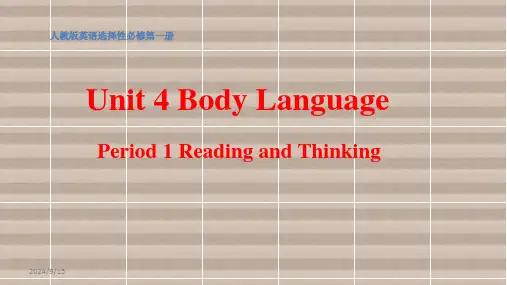
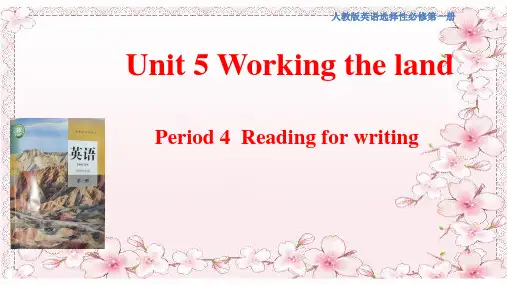
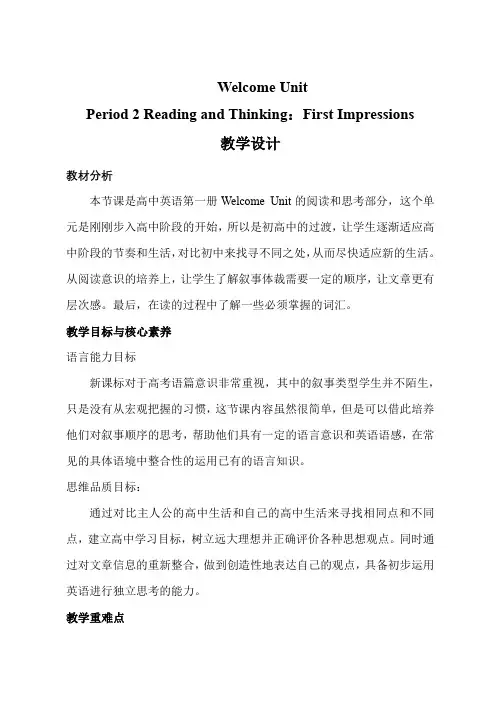
Welcome Unit
Period 2 Reading and Thinking:First Impressions
教学设计
教材分析
本节课是高中英语第一册Welcome Unit的阅读和思考部分,这个单元是刚刚步入高中阶段的开始,所以是初高中的过渡,让学生逐渐适应高中阶段的节奏和生活,对比初中来找寻不同之处,从而尽快适应新的生活。
从阅读意识的培养上,让学生了解叙事体裁需要一定的顺序,让文章更有层次感。
最后,在读的过程中了解一些必须掌握的词汇。
教学目标与核心素养
语言能力目标
新课标对于高考语篇意识非常重视,其中的叙事类型学生并不陌生,只是没有从宏观把握的习惯,这节课内容虽然很简单,但是可以借此培养他们对叙事顺序的思考,帮助他们具有一定的语言意识和英语语感,在常见的具体语境中整合性的运用已有的语言知识。
思维品质目标:
通过对比主人公的高中生活和自己的高中生活来寻找相同点和不同点,建立高中学习目标,树立远大理想并正确评价各种思想观点。
同时通过对文章信息的重新整合,做到创造性地表达自己的观点,具备初步运用英语进行独立思考的能力。
教学重难点
1.重点
(1)通过skimming 的方式快速找出文章的叙述顺序;
(2)学会用已知的内容去解决未知的问题,用已经了解的词汇去学习新的词汇;
2. 难点
(1)可以分辨叙述顺序,并可以换一种顺序来叙述;
(2)学会寻找一段中的关键词来重复故事。
教学过程。
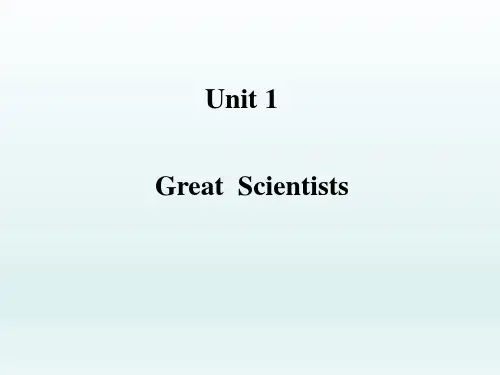
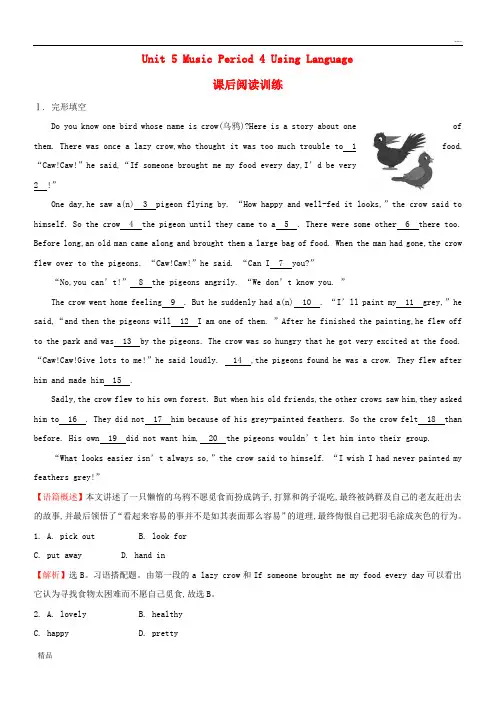
Unit 5 Music Period 4 Using Language课后阅读训练Ⅰ. 完形填空Do you know one bird whose name is crow(乌鸦)?Here is a story about one ofthem. There was once a lazy crow,who thought it was too much trouble to 1 food. “Caw!Caw!”he said,“If someone brought me my food every day,I’d be very2 !”One day,he saw a(n) 3 pigeon flying by. “How happy and well-fed it looks,”the crow said to himself. So the crow 4 the pigeon until they came to a 5 . There were some other 6 there too. Before long,an old man came along and brought them a large bag of food. When the man had gone,the crow flew over to the pigeons. “Caw!Caw!”he said. “Can I7 you?”“No,you can’t!”8 the pigeons angrily. “We don’t know you. ”The crow went home feeling 9 . But he suddenly had a(n) 10 . “I’ll paint my11 grey,”he said,“and then the pigeons will12 I am one of them. ”After he finished the painting,he flew off to the park and was 13 by the pigeons. The crow was so hungry that he got very excited at the food. “Caw!Caw!Give lots to me!”he said loudly. 14 ,the pigeons found he was a crow. They flew after him and made him 15 .Sadly,the crow flew to his own forest. But when his old friends,the other crows saw him,they asked him to 16 . They did not 17 him because of his grey-painted feathers. So the crow felt 18 than before. His own 19 did not want him, 20 the pigeons wouldn’t let him into their group.“What looks easier isn’t always so,”the crow said to himself. “I wish I had never painted my feathers grey!”【语篇概述】本文讲述了一只懒惰的乌鸦不愿觅食而扮成鸽子,打算和鸽子混吃,最终被鸽群及自己的老友赶出去的故事,并最后领悟了“看起来容易的事并不是如其表面那么容易”的道理,最终悔恨自己把羽毛涂成灰色的行为。

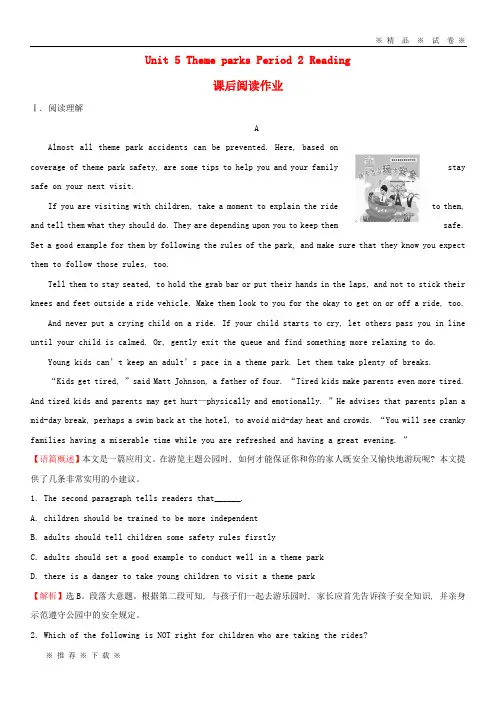
Unit 5 Theme parks Period 2 Reading课后阅读作业Ⅰ. 阅读理解AAlmost all theme park accidents can be prevented. Here, based oncoverage of theme park safety, are some tips to help you and your family stay safe on your next visit.If you are visiting with children, take a moment to explain the ride to them, and tell them what they should do. They are depending upon you to keep them safe. Set a good example for them by following the rules of the park, and make sure that they know you expect them to follow those rules, too.Tell them to stay seated, to hold the grab bar or put their hands in the laps, and not to stick their knees and feet outside a ride vehicle. Make them look to you for the okay to get on or off a ride, too.And never put a crying child on a ride. If your child starts to cry, let others pass you in line until your child is calmed. Or, gently exit the queue and find something more relaxing to do.Young kids can’t keep an adult’s pace in a theme park. Let them take plenty of breaks.“Kids get tired,”said Matt Johnson, a father of four. “Tired kids make parents even more tired. And tired kids and parents may get hurt—physically and emotionally. ”He advises that parents plan a mid-day break, perhaps a swim back at the hotel, to avoid mid-day heat and crowds. “You will see cranky families having a miserable time while you are refreshed and having a great evening. ”【语篇概述】本文是一篇应用文。
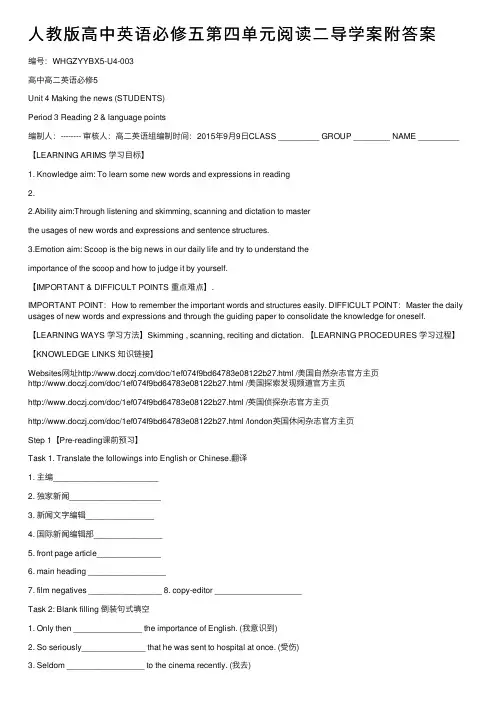
⼈教版⾼中英语必修五第四单元阅读⼆导学案附答案编号:WHGZYYBX5-U4-003⾼中⾼⼆英语必修5Unit 4 Making the news (STUDENTS)Period 3 Reading 2 & language points编制⼈:-------- 审核⼈:⾼⼆英语组编制时间:2015年9⽉9⽇CLASS _________ GROUP ________ NAME _________【LEARNING ARIMS 学习⽬标】1. Knowledge aim: To learn some new words and expressions in reading2.2.Ability aim:Through listening and skimming, scanning and dictation to masterthe usages of new words and expressions and sentence structures.3.Emotion aim: Scoop is the big news in our daily life and try to understand theimportance of the scoop and how to judge it by yourself.【IMPORTANT & DIFFICULT POINTS 重点难点】.IMPORTANT POINT:How to remember the important words and structures easily. DIFFICULT POINT:Master the daily usages of new words and expressions and through the guiding paper to consolidate the knowledge for oneself.【LEARNING WAYS 学习⽅法】Skimming , scanning, reciting and dictation. 【LEARNING PROCEDURES 学习过程】【KNOWLEDGE LINKS 知识链接】Websites⽹址/doc/1ef074f9bd64783e08122b27.html /美国⾃然杂志官⽅主页/doc/1ef074f9bd64783e08122b27.html /美国探索发现频道官⽅主页/doc/1ef074f9bd64783e08122b27.html /英国侦探杂志官⽅主页/doc/1ef074f9bd64783e08122b27.html /london英国休闲杂志官⽅主页Step 1【Pre-reading课前预习】Task 1. Translate the followings into English or Chinese.翻译1. 主编_______________________2. 独家新闻____________________3. 新闻⽂字编辑_______________4. 国际新闻编辑部_______________5. front page article______________6. main heading _________________7. film negatives ________________ 8. copy-editor ___________________Task 2: Blank filling 倒装句式填空1. Only then _______________ the importance of English. (我意识到)2. So seriously______________ that he was sent to hospital at once. (受伤)3. Seldom _________________ to the cinema recently. (我去)4. Not only________________ good at languages, but also at history. (她)5. In front of the house_______ a small boy and his father. (be)6. Here ___________________ the bus. Let’s hurry. (come)Step 2【Self-study ⾃主学习】Task 3: Skimming & Scanning略读寻读找答案1. Read the text quickly and tick out the main idea of the text.()A . It introduces how to get a scoop.B. It introduces the process of writing and printing for a newspaper article.C. It introduces a scoop about a famous film star.2. What was Zhou Yang asked to do as soon as he came back into the office after an interview with a famous film star. ( )A. He was asked to go to another interview.B. He was asked to write the story as soon as possible.C. He was asked to attend an important meeting.D. He was asked to have dinner with the chief editor.3. Why did Zhou Yang have to be accurate while writing the story? ( )A. He was afraid of being accused.B. he wanted to write a more exciting story.C. He formed a habit of being careful.D. He wanted to write a true story.4. How many types of job are there when making a newspaper except the native speaker? ( )A. 4B. 5C. 6D. 75. What’s the main id ea of this passage? ( )A. How to do a good interview.B. How a newspaper is made.C. How to write an interesting story for a newspaper.D. Making a newspaper is difficult.Step 3【Co-operation study 合作探究】Task 4.Understanding for language points根据课⽂内容合作讨论并完成下列语⾔点的理解和练习。
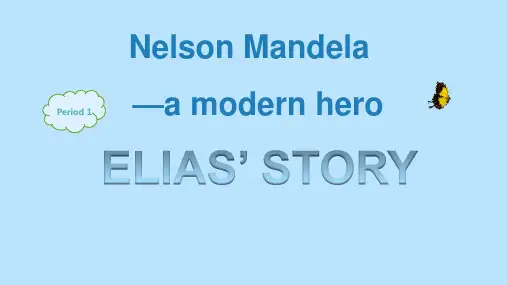
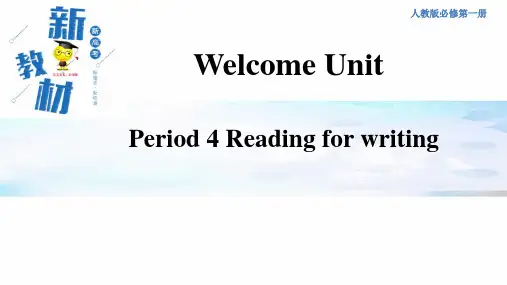
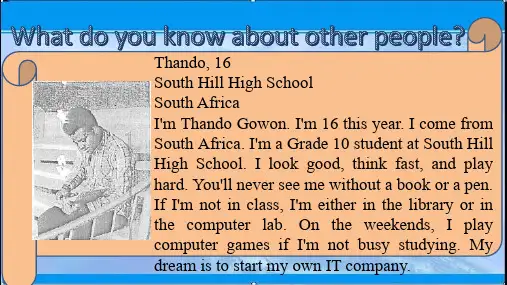
Unit 4 Natural DisastersPeriod 2Reading and Thinking教材分析该板块以“描述自然灾害”(Describe a natural disaster)为活动主题,要求学生通过阅读文本,了解我国20世纪70年代发生在唐山的大地震,学习报告文学这种纪实性文体的语言特征,最后完成用自己的语言描述自然灾害的任务。
该语篇文本没有报告文学中常见的中心人物,但按地震前、中、后的顺序向读者整体描述了唐山大地震这场灾难。
全文描写生动、包含情感,体现了作者想要表达“灾害无情,人有情”的思想感情。
教学目标1. 能正确理解使用下列词汇:ruin, percent, brick, metal, shock, electricity, trap, bury, breathe, effort, wisdom, context, suffer等。
2. 阅读描述重大灾害的纪实性报告文学语篇,掌握该类语篇的语言特征和叙事要点,能分析阅读语篇的文本结构。
3. 掌握在阅读中根据上下文猜测词义的策略;巩固合成词的相关知识;能运用构词法知识推测词义。
4. 从历史事件的角度了解国内外发生过的一些重大自然灾害,树立防灾意识和自我保护意识。
5. 能够了解和掌握一些与自然灾害相关的安全常识和防范措施。
教学重难点【教学重点】帮助学生掌握报告文学兼具文学性和纪实性的语言特征,让学生学会欣赏文本中所运用的修辞方法和写作技巧,理解作者在作品中所表达的情感和写作意图。
【教学难点】掌握在阅读中根据上下文猜测词义的策略。
教学过程Step 1 Warming-upHave a brief review of the natural disasters mentioned in news reports in Period 1. Discuss ingroups what can happen to a city during a big earthquake.设计意图:回顾上节课的内容,激活关于自然灾害和地震的背景知识。
Unit 4 Making the news(Module 5)Period 1 Reading: My First Work Assignment“ Unforgettable”, says new journalist班级__________ 姓名____________ 学号_____________学习目标:1. Learn the new words and expressions in the reading material2.Read the passage and know about Zhou Yang’s first work assignment.3. Learn the reading skills学习重点:1. Grasp the important words and expressions in the reading material2. Know about Zhou Yang’s first assignment.学习难点:1.Grasp the important words and expressions.2. Encourage the students to talk about jobs in newspapers and what is needed to work in a newspaper office学习过程:I. Pre-class homework (课堂前置性作业)Ⅰ. Pre-readingDiscuss the question in groups.If you want to be a reporter, do you think what qualities a good news reporter needs to have? Collect their idea and fill in the chart on P25.Ⅱ. ReadingA. Main idea:The passage is about Zhou Yang’s first__________at the office of a popular newspaper. His boss, an __________ journalist, told Zhou Yang _______________________________.B. Skimming:Read the passage and answer the following questions:1. What does the reading passage mainlyA. The skills necessary to become a good reporterB. The skills necessary to become a good photographerC. How to conduct a good interviewD. Being carefully in the new environmentE. A and C2. How many questions does Zhou Yang ask his new boss, Hu Xin? Please underline all these questions.3. How did Zhou Yang feel on his first day at work ?II. While-class (课堂教学流程)Step1.Lead inStep2.Discussion (小组讨论交流课堂前置性作业)Step3.Detailed readingⅢ. Post-reading1. Choose the correct explanations to the underlined phrases.(1) What do I need to remember when I go out to cover a story?A. tell a storyB. write storyC. report a story(2) A good journalist must have a good “nose” for a story.A. be able to “smell” the truth when somebody is telling part of it.B. be able to discover the whole truth by doing research.C. B and C(3) This is a trick of the trade.A. something that cheats somebodyB. something that helps you do the job in a professional way.C. something used to hide secrets.(4)We sometimes use small recorders to make sure that we get all your facts straight.A. to make sure that the story is accurateB. to get the facts directlyC. to get the things specially2. Fill in the blanks with the correct words.Zhou Yang’s first job will be an (1) ______________ (assist) journalist and his boss has told him many things he should keep in mind. Firstly, he can’t go out (2) _____________ a story immediately because he is not (3) ________________ (experience) enough. There is no (4) _______________ for a camera because he’ll have a (5) ________________ (profession) photographer with him to take photographs. Secondly, (6) _________________ (be ) a good journalist, he needs to be curious if he wants to acquire all the information he wants. A good journalist must have a good “nose”(7) _______________ a story. Thirdly, he needs to learn to listen for detailed facts and prepare the next question (8) _________________ (depend) on what the interviewee says. Lastly, the boss told him a case (9) ________________ someone accused their journalists (10) ___________________ getting the wrong end of the stick.Step5.Presenting (成果展示与教师点拨)Ss present their group jobA. choose the correct answersB. Cloze testStep8.Summary(学生小结)Ss talk about what they have learned in the lessonkeys:1.pre-reading :略Ⅱ. ReadingA. Main idea:Key: assignment, experienced, something about what to do when a journalist goes out to cover a story./ how to be a good reporter.B.SkimmingⅠ1. E2.(1) Can I go out on a story immediately?(2) What do I need to take with me?(3) What do in need to remember when I go out to cover a story?(4) What should I keep in mind?(5) Why is listening so important?(6) But how can I listen carefully while taking notes?(7) Have you ever had a case where someone accused your journalists of getting thewrong end of the stick?3. enthusiastic, eager to learn, modest…Step3.Detailed readingⅢ. Post-reading(1) C(2) C(3) B(4) A2. Cloze test(1) assistant (2) on (3) experienced (4) need (5) professional(6) to be (7) for (8) depending (9) where (10) ofUnit4 Module 5Period 2 Grammar:Inversion班级_____________ 姓名___________ 学号____________学习目标:. 1. Ss learn the use of inversion.2. Ss use inversion correctly and properly according to the context.学习重点:How to use Inversion correctly学习难点:Have Ss grasp the skills needed to use Inversion correctly.学习过程:I. Pre-class homework (课堂前置性作业)一. 知识回顾英语最基本的语序是_________在前,_________在后。
Welcome unit Period4 Reading for writing 导学案(1)1. To write a good profile using some writing skills properly.2. To master some writing words related to a person’s profile.1. To have a good understanding of a person’s profile.2.To write a good profile using some writing skills properly.1. Read the student profile on page 8 and discuss the questions. 1. What is Ann like?2. What are Ann’s hobbies?3. What is Ann’s dream?4. Where does Thando come from?5.What is Thando’s dream?6.What kind of person is Thando?7. What does “you will never see me without a book or a pen” mean?2. Fill in the formMain aspects about profilesName, age,Personali tyFavorite subjectLearnin g styleHobbies f uture plansand dreams3: Read to write down the phrases that Ann and Thando use to describe their personalities and the sentences that they use to describe their learning styles. Ann:Phrases that Ann uses to describe her personalitiesThe sentences that Ann uses to describe her learning styles. Thando:Phrases that Thando uses to describe his personalitiesThe sentences that Thando uses to describe his learning styles.4: Use what you have learnt to write your own student profile. 1. Complete the outline and use it to draft your student profile. OutlineYour student profile draft【答案】1. Read the student profile on page 8 and discuss the questions.1. What is Ann like?She is active, athletic, curious, and hardworking.2. What are Ann’s hobbies?Dancing and skating3. What is Ann’s dream?To become an engineer in the future4. Where does Thando come from?South Africa5. What is Thando’s dream?To start his own IT computer6. What kind of person is Thando?He is healthy, hardworking, and smart.7. What does “you will never see me without a book or a pen” mean? It means he is hardworking. He likes reading books and taking notes.2. Fill in the form3: Read to write down the phrases that Ann and Thando use to describe their personalities and the sentences that they use to describe their learning styles.Ann :Phrases to describe her personalities :an active person be curious aboutSentences to describe her learning styles:I often ask questions, but I learn best by doing.ThandoPhrases to describe his personalities :Think fast, play hard,Sentences to describe his learning styles:You will never see me without a book or a pen. If I am not in class, I’m either in the library or in the computer lab.4: Use what you have learnt to write your own student profile.1. Complete the outline and use it to draft your student profile.OutlineYour student profile draft。